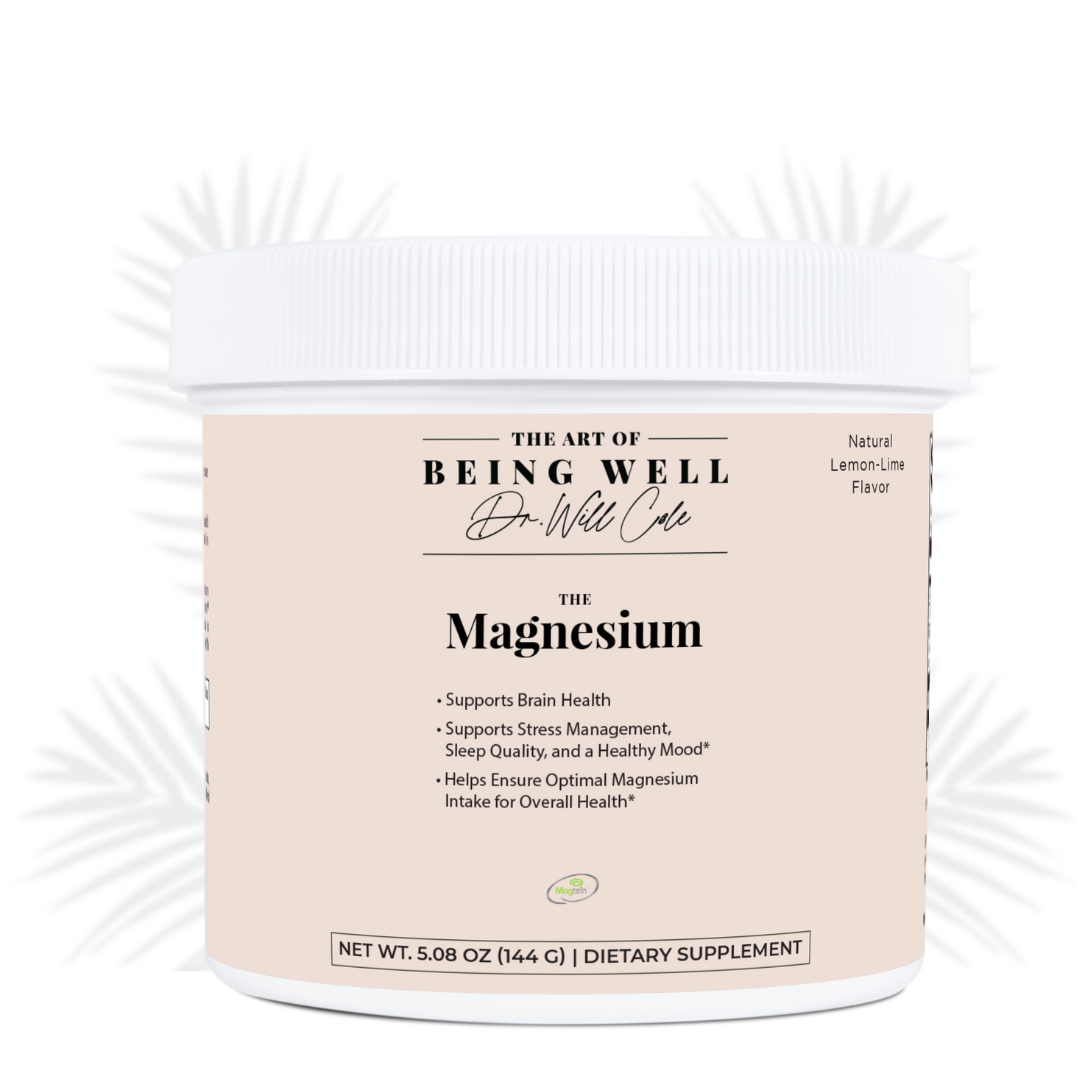What Are The Different Types Of Magnesium Supplements + Which One Should I Take?

You can get magnesium through your diet, but at least half of us aren’t getting enough. As a functional medicine practitioner, low magnesium is one of the most common issues I see in patients dealing with changes in mood, energy levels, and digestive problems.
Food sources are always the first place to start, but magnesium supplements can help you get levels to where they should be to feel good again. Different types of magnesium target different areas of your health; how much magnesium you should take depends on your symptoms.
Magnesium + Your Health
What does magnesium do for the body? Magnesium benefits cognitive health, heart health, bone health, and muscle function. It can improve sleep quality, nerve function, and blood sugar levels.
Healthy magnesium levels are even good for your mental health and combating migraine headaches. Symptoms of low magnesium include:
- Muscle cramps
- Fatigue
- Brain fog
- Nausea and vomiting
- Loss of appetite
- Muscle weakness
- Headaches
A true magnesium deficiency, or hypomagnesemia, isn’t as common, but low magnesium levels can become serious if you don’t address them. Chronic health conditions like kidney disease or digestive issues that cause malabsorption are risk factors that can lead to a deficiency. (1)
Symptoms of hypomagnesemia include:
- Personality changes
- Seizures
- Low blood pressure
- Irregular heartbeat or heart rhythm
- Insomnia
Chronic magnesium deficiency has been linked to a higher risk of osteoporosis, cardiovascular disease, insulin resistance, and type 2 diabetes. Getting enough magnesium affects long-term health. (2)
10 Types Of Magnesium Supplements
What types of magnesium are there? Popular magnesium supplements are compounds like magnesium oxide, magnesium citrate, and magnesium glycinate. They typically come in capsule or powder form and can be mixed into water, smoothies, or magnesium-rich mocktails.
The best full-spectrum magnesium is typically combined with other ingredients to achieve a specific result or make it more bioavailable.
When choosing a supplement, it’s important to know what each supplement targets regarding the health benefits of magnesium, even in a multivitamin.
Magnesium Citrate
Magnesium citrate is a form of magnesium combined with citric acid. It’s known for its high bioavailability, which means it’s more easily absorbed by the body compared to other forms.
Due to its laxative effect, this is the best magnesium for gut health if you’re dealing with chronic constipation and seeking constipation relief. (3) It helps draw water into the intestines, loosening packed stools to induce bowel movements.
Magnesium citrate is commonly available in tablets or capsules, but it can also be mixed into smoothies or water if you pick it up in powder form.
Magnesium Oxide
Magnesium oxide is another commonly prescribed antidote for constipation relief. It can also act as an antacid to relieve heartburn and indigestion. Some clinical trials show promise for its use in migraine relief, but its low absorption rate may make it less effective than other forms. (4)
Despite lower bioavailability, this is one of the most common magnesium supplements on store shelves. You’re most likely to see it in tablet or capsule form.
Shop This Article
My magnesium complex is carefully curated with enhanced bioavailability in mind to support healthy sleep, cognition, and both long- and short-term memory with optimal absorption.
Magnesium Glycinate
Magnesium glycinate is a compound formed from magnesium and the amino acid glycine. Since glycine has a calming effect on the body and the brain, this is a great option for anyone looking to improve sleep and lower anxiety. (5)
Those anti-inflammatory effects make this one of the best magnesium supplements for women. A daily intake of magnesium glycinate is linked to improved premenstrual syndrome symptoms like abdominal cramping, mood changes, and sleep problems. (6)
This one is highly bioavailable and less likely to have a laxative effect, so it’s also a good option for those with sensitive gut health. Some people like magnesium glycinate for leaky gut, irritable bowel syndrome (IBS), and Crohn’s disease, thanks to its anti-inflammatory effects on gut health. (7)
You can find it in capsule, gummy, or powder form.
Magnesium Malate
Magnesium malate combines magnesium with malic acid, an acid found in fruits like apples, apricots, cherries, and plums that gives those fruits a sour aftertaste. When combined with magnesium, it may have some effect on pain relief, particularly in fibromyalgia patients. (8)
Malic acid also plays a role in energy production, so a dose of magnesium with malic acid may work to combat fatigue and improve overall energy levels. (9) This one is found in tablet or powder form.
Magnesium Threonate (L-Threonate)
Magnesium l-threonate is a compound of magnesium and threonic acid, a metabolite of vitamin C. This form is noted for its ability to cross the blood-brain barrier, which may support cognitive and neurological health in older adults. (10)
LISTEN: The Shocking Longevity & Brain Science That Will Save Your Life | Dr. Gabrielle Lyon
Positive effects on overall brain health and neurotransmitter function could mean reduced symptoms of anxiety, brain fog, and insomnia, but more research is needed to understand why.
This one has a high absorption and retention rate and is available as capsules or a powder. Just like any high-quality supplement, the best magnesium l-threonate powder will be free from additives, fillers, and inactive ingredients.
Magnesium Chloride
A combination of magnesium and chloride, this form of magnesium is highly absorbable and used for both dietary supplementation and topical applications. Taken orally, it’s used as a mild laxative for those with gut dysfunction.
Animal studies show it may also have a positive effect on inflammation that affects liver enzymes, a marker of diabetes, certain cancers, and fatty liver disease. (11)
As a topical treatment, it’s used for muscle relaxation and chronic pain relief. Topical treatments typically come in the form of magnesium oils or bath flakes.
Magnesium Sulfate
You’re probably more familiar with the common name for magnesium sulfate: Epsom salts. Most people use them as a foot or full body soak to soothe sore muscles, reduce inflammation, and relieve tension. They may also improve skin health and relieve itching and redness.
Magnesium sulfate can also be dissolved in water or electrolyte drinks and used as an oral laxative. Some studies show promise for this form as a treatment for restless legs syndrome (RLS), but those are limited to intravenous use at this time. (12)
Magnesium Acetyl Taurate
Magnesium acetyl taurate, also known as magnesium taurate, is a compound that combines magnesium with taurine, an amino acid that supports cardiovascular and neurological health.
This form of magnesium may support reduced heart disease risk thanks to its effects on hypertension, or high blood pressure. (13) Much like magnesium l-threonate, it can also pass through to the brain, so it may affect anxiety, depression symptoms, and mood. (14)
Magnesium taurate is commonly available in capsule form, but you can also find it as a powder.
Magnesium Orotate
Magnesium orotate is a magnesium salt combined with orotic acid, an acid that plays a role in energy production and the metabolism of vitamins like folic acid, B12, and vitamin D. It’s been linked to improved muscle recovery and endurance, so it’s a favorite among athletes. (15)
This one may also benefit your heart. It’s been used as a therapy in congestive heart failure patients, which has shown promising results, and as an alternative treatment for hypertension. (16) Magnesium orotate is typically found in capsule form or as a powder with added potassium.
Magnesium Lactate
Magnesium lactate is a compound of magnesium and lactic acid. While it’s one of the less popular magnesium supplements out there, healthcare providers recommend this one when patients have a sensitive stomach. This is because it is known for being gentler on the digestive system.
This supplement is used for general magnesium supplements in cases of magnesium deficiency and by patients with digestive conditions that cause malabsorption. Capsules are most common, but the supplement is also available in powder form, often with added calcium for muscle and bone health. (17)
Recommended Dosage
According to the National Institutes of Health (NIH), the recommended dietary allowance (RDA) of magnesium for healthy adults between 19-30 is 400 mg for men and 310 mg for women. It’s 420 mg for men and 320 mg for women 31 years of age and older. (18)
Women who are pregnant should aim for 360 mg per day. The RDA for breastfeeding women is 320 mg.
How many mg of magnesium should I take? You should try to get the RDA of magnesium as your daily intake level. Your needs may vary from there based on baseline magnesium levels, any existing medical conditions, and medication regimen.
Your healthcare professional is your best resource for a more individualized recommended amount of magnesium for maintenance, symptom relief, or to correct deficiencies.
To boost your intake through diet, eat magnesium-rich foods. Green leafy vegetables, legumes like black beans, pumpkin seeds, nuts like cashews and almonds, and whole grains are great. Generally, foods high in fiber, like fortified cereals, are good sources of magnesium.
You may still be low with a healthy diet, though. Only about a third of dietary magnesium is absorbed by the body.
What To Watch For
Magnesium is generally safe when taken as recommended, but it can interact with other medications, such as diuretics and certain antibiotics. Taking too much magnesium is never recommended.
What are the side effects of taking magnesium supplements? High doses of magnesium can cause gastrointestinal side effects like an upset stomach, nausea, vomiting, and diarrhea. In rare cases, large amounts of magnesium can cause magnesium toxicity.
Finding The Right Health Solutions For You
You should always take an individualized approach before starting any new supplement regimen. A functional medicine doctor can get the process started by testing your magnesium levels and coming up with a plan for boosting your magnesium intake through diet and supplementation.
If you’re interested in a holistic approach to your health to get you feeling your best, I can help you get there. Schedule a consultation to get to the root of your symptoms and get on the path to long-term wellness.
View More At Our Store
Purchase personally curated supplements
and Dr. Will Cole’s books!

The information on this website has not been evaluated by the Food & Drug Administration or any other medical body. We do not aim to diagnose, treat, cure or prevent any illness or disease. Information is shared for educational purposes only. You must consult your doctor before acting on any content on this website, especially if you are pregnant, nursing, taking medication, or have a medical condition.
Our content may include products that have been independently chosen and recommended by Dr. Will Cole and our editors. If you purchase something mentioned in this article, we may earn a small commission.

BY DR. WILL COLE
Dr. Will Cole, DNM, IFMCP, DC is a leading functional medicine expert who consults people around the globe, starting one of the first functional medicine telehealth centers in the world. Named one of the top 50 functional and integrative doctors in the nation, Dr. Will Cole provides a functional medicine approach for thyroid issues, autoimmune conditions, hormonal imbalances, digestive disorders, and brain problems. He is also the host of the popular The Art of Being Well podcast and the New York Times bestselling author of Intuitive Fasting, Ketotarian, Gut Feelings, and The Inflammation Spectrum.

Gut Feelings
Healing The Shame-Fueled Relationship
Between What You Eat And How You Feel



